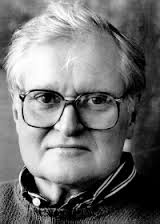 Armed with a large vocabulary and a disdain for convention, American poet John Ashbury has won almost every major award for his work, including a Pulitzer in 1976. He was born in New York in 1927 but was brought up on a farm near Lake Ontario and began writing poetry at a very early age.
Armed with a large vocabulary and a disdain for convention, American poet John Ashbury has won almost every major award for his work, including a Pulitzer in 1976. He was born in New York in 1927 but was brought up on a farm near Lake Ontario and began writing poetry at a very early age.
Influenced by poetic contemporaries such as W.H. Auden and Dylan Thomas, he went to Harvard University and graduated in 1949. There he met other writers and poets including Barbara Epstein and Ed Gorey, before heading to New York where he earned an MA from Columbia University. For the next few years he earned a living writing copy and then, with a scholarship, went to France where he worked on various projects including translations.
His first award came in 1956 for his collection Some Trees which marked his initial forays into experimenting with the avant-garde. He wrote two more collections whilst in France, including Rivers and Mountains in 1966, and then returned to New York, becoming acquainted with the likes of Andy Warhol, and writing the Double Dream of Spring which brought him more recognition when it was published in 1970.
Whilst his earlier poems showed an adherence to poetic form, his later verse became increasingly experimental, challenging the norms of language whilst dealing with the intricate workings of the human mind. Through the 70s he came to be seen as one of America’s more influential poets and in 1975 he produced Self Portrait in a Convex Mirror which won him the Pulitzer Prize and several other awards.

Like many poets in America at the time, Ashbery’s verse had been influenced by painters particularly the abstract expressionists and his work as an art critic may well have helped form his uniquely experimental style.
At times difficult to read, his poetry has garnered many imitators and critics over the years as it attempts to reflect the multifaceted nature of life itself. He doesn’t believe in poetry that flows along neat lines because life is disjointed and this has often led to criticism that his poems are garbled and disjointed.

Since he published his Pulitzer Prize winning Portrait in a Convex Mirror, Ashbery has produced no fewer than 18 books that have confused, confounded and delighted critics. In later years, he has turned his attention to the notion of aging and death with works such as Girls on the Run and A Worldly Country and he has been compared to Walt Whitman on numerous occasions. Each of his poems contains a diverse range of images, tones, and sounds, veering this way and that as the mind does. An example of this style is one of his most well-known works, Paradoxes and Oxymorons, which explores the relationship between culture and identity.
Between 2001 and 2003, Ashbery became Poet Laureate for New York State and his latest work, Quick Question appeared in 2012. Now approaching his 90s, he divides his time between New York and Hudson and still lives with his partner David Kermani.

